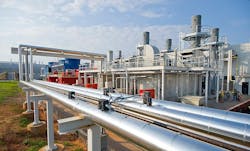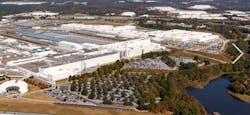BMW celebrates 20 years of Landfill-to-Energy CHP at South Carolina Manufacturing plant
Sustainability hasn’t ever gone out of style since then, as the landfill-to-energy pipeline serving the automaker’s on-site power at its Spartanburg, South Carolina, assembly plant has help cut costs and emissions. The German-based BMW Group two decades ago began using recycled methane gas from a nearby landfill to provide combined heat and power (CHP) for its manufacturing, assembly and administrative facilities there.
BMW has spent close to $13 billion on Spartanburg and its combined South Carolina operations during those years, making such models as the X3, X5 and X7 sports utility vehicles. The work on the landfill gas pipeline, led by developer Ameresco, has reportedly avoided close to 9,200 tons of carbon dioxide emissions per year, as well as removing methane gas buildup and leaking from the landfill.
Environmental experts contend that methane is far more damaging as a greenhouse gas than even CO2. Over the 20 years, it’s possible as much as 180,000 tons of CO2 has been avoided that would otherwise be emitted with a traditional fossil fuel-fired power plant, the automaker estimated.
“Intelligent resource management and the fight against climate change are expressions of our sense of responsibility,” Robert Engelhorn, president and CEO of BMW Manufacturing, said in a statement. “The BMW Group will reduce CO2 emissions per vehicle by 40 percent from 2019 levels by 2030 across the spectrum.”
Massachusetts-based Ameresco built the pipeline from the Palmetto Landfill to the Plant Spartanburg, as well as the natural gas processing and compression stations. During its 20-year celebration, BMW announced it was extend the partnership with Ameresco for another eight years.
When this partnership began, Net Zero was more of a sign of basketball futility than a key climate goal.
“When we look back to the start of this partnership more than 20 years ago, sustainability was in its infancy,” Michael Bakas, Ameresco’s executive vice president, said. “We are excited to be celebrating the renewal of an innovative project engagement that was far ahead of its time. We are also grateful for the many core team members at BMW whose passion for sustainability resulted in a best-in-class project to harness the power of biogas solutions to usher in a cleaner era for the auto industry.”
The landfill gas provides about 20 percent of the fuel needs at the CHP plant.
Landfill gas typically would simply leech out or be flared (burned) off at various relief points in the landfill. Instead, the Ameresco-BMW project captures the methane via dozens of gas extraction wells, then it was treated to remove moisture and impurities and later compressed. From there it travels down the 9.5-mile pipeline to Plant Spartanburg. There it is cleaned and compressed again and then fed into gas turbines at the plant’s energy center to generate electricity and heat for the eight million square-foot site.
Plant Spartanburg is pivotal to BMW operations in the U.S. The automakers employs close to 11,000 people there, while also hosting a performance driving school and museum.
The German firm is expanding to build electric vehicles at the facility and also announced plans for a new EV battery plant to complement manufactuing there.
-- -- --
(Rod Walton, senior editor for EnergyTech, is a 15-year veteran of covering the energy industry both as a newspaper and trade journalist. He can be reached at [email protected]).
Follow us on Twitter @EnergyTechNews_ and @rodwaltonelp and on LinkedIn
About the Author
Rod Walton, EnergyTech Managing Editor
Managing Editor
For EnergyTech editorial inquiries, please contact Managing Editor Rod Walton at [email protected].
Rod Walton has spent 17 years covering the energy industry as a newspaper and trade journalist. He formerly was energy writer and business editor at the Tulsa World. Later, he spent six years covering the electricity power sector for Pennwell and Clarion Events. He joined Endeavor and EnergyTech in November 2021.
Walton earned his Bachelors degree in journalism from the University of Oklahoma. His career stops include the Moore American, Bartlesville Examiner-Enterprise, Wagoner Tribune and Tulsa World.
EnergyTech is focused on the mission critical and large-scale energy users and their sustainability and resiliency goals. These include the commercial and industrial sectors, as well as the military, universities, data centers and microgrids. The C&I sectors together account for close to 30 percent of greenhouse gas emissions in the U.S.
He was named Managing Editor for Microgrid Knowledge and EnergyTech starting July 1, 2023
Many large-scale energy users such as Fortune 500 companies, and mission-critical users such as military bases, universities, healthcare facilities, public safety and data centers, shifting their energy priorities to reach net-zero carbon goals within the coming decades. These include plans for renewable energy power purchase agreements, but also on-site resiliency projects such as microgrids, combined heat and power, rooftop solar, energy storage, digitalization and building efficiency upgrades.


